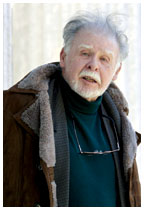
|
April 4, 2007: A moment with...
Walter F. Murphy |
Walter F. Murphy
Walter F. Murphy, the McCormick Professor of Jurisprudence, emeritus, returned to Princeton in early March for a symposium on his new book, Constitutional Democracy: Creating and Maintaining a Just Political Order, which explores the lessons of constitution-making from ancient Greece to today. The book is being hailed as a masterwork capping a distinguished career. Murphy spoke with PAW contributor Merrell Noden ’78 after the conference.
You said that you are on a terrorist watch list and so were stopped by airport security on the way to this event at Princeton. Why?
Yes. I’m a retired colonel in the Marine Corps [awarded the Purple Heart and Distinguished Service Cross], which would indicate that I’m probably not a terrorist. But I did speak against Bush [at Princeton last September]. That’s the only reason I can give.
You argue in your book that the Constitution is open-ended about who should interpret it.
It isn’t judges alone who should interpret the Constitution, but presidents and members of Congress ... and also the electorate. By 1936 the Supreme Court had declared unconstitutional almost every important part of Franklin D. Roosevelt’s New Deal. He ran for re-election and he carried 46 states. That was just a stinging [electoral] rebuke to the Court.
Speaking of presidents, George W. Bush has twice sworn to “preserve, protect, and defend” the Constitution. How’s he doing?
Poorly. He has said, “I am the decider” and ignored congressional statutes. Recently, he said he would go to the courts for warrants to wiretap. But for four-plus years he said he wouldn’t, and his excuse was so lame as to be totally unbelievable. He said it would take too long. Well, there’s a special court set up that meets in secret, designed to make sure that what Richard Nixon did would never happen again. While I’m not an originalist, I think you’ve got to take a lot of what people like Madison and Hamilton said very seriously. And in the Federalist Papers, Madison said if all power is concentrated in the hands of a single person, a single office, or a single branch of government, you’ve got the definition of tyranny.
I have chided some of my originalist friends, who say, look to an originalist understanding. The objective these [framers] apparently shared was a determination to prevent the recurrence of what the British called “writs of assistance” — where the executive could search and seize without a judicial warrant. It’s the classic thing that the Fourth Amendment was designed to prevent! But I have not heard one single originalist raise that objection against Bush’s policies. They raised it against Johnson, against the Supreme Court. Not against Bush.
What sparked your interest in the Constitution?
Mine was generated by an undergraduate course in constitutional law, which I found fascinating. I went off to graduate school at [the University of] Chicago without intending to study it. But a number of things happened. I fell in with a marvelous professor. And also it turned out that some school desegregation cases were coming up in Charleston [S.C., where Murphy grew up], and some voting-rights cases, too. One of my neighbors in Charleston was a federal judge who suddenly had a spate of cases before him. He decided for the blacks and was ostracized from the local community. Somebody fired a shot through his window at night.
Were you aware of all that ugliness when you were growing up?
Being a white Irish Catholic in the deep South, in the Bible Belt, I felt a lot of discrimination. When Kennedy was assassinated, my mother, who was still teaching high school in South Carolina, said she received a note from the principal on that Friday afternoon that said, “John F. Kennedy has been assassinated. Please announce this to your students, and please instruct them that they shall not applaud.”
I was denied admission to Princeton as an undergraduate. I was first in my class at a Catholic high school and won a National Merit Scholarship. I got a letter from the admissions committee saying, “We think you’d be happier at a Catholic school.”
You ultimately did go to a Catholic university, to Notre Dame, and you’ve written three novels in which religion plays a significant role. Are you a religious person?
I’m a Catholic of sorts. I like to think I’m a Catholic,
but I’m sure the pope would look on me as a heretic. [Supreme Court
Justice Antonin] Nino Scalia, who’s an old friend, very intelligent
with a great sense of humor — we sometimes can go 10 minutes without
shaking fingers at each other! — claims I’m a “cafeteria
Catholic,” meaning I pick and choose. And he’s right. He says
my attitude on birth control is wrong. But on the death penalty, he doesn’t
take the Catholic position. He’s cafeteria, too. We just have different
selections. ![]()

